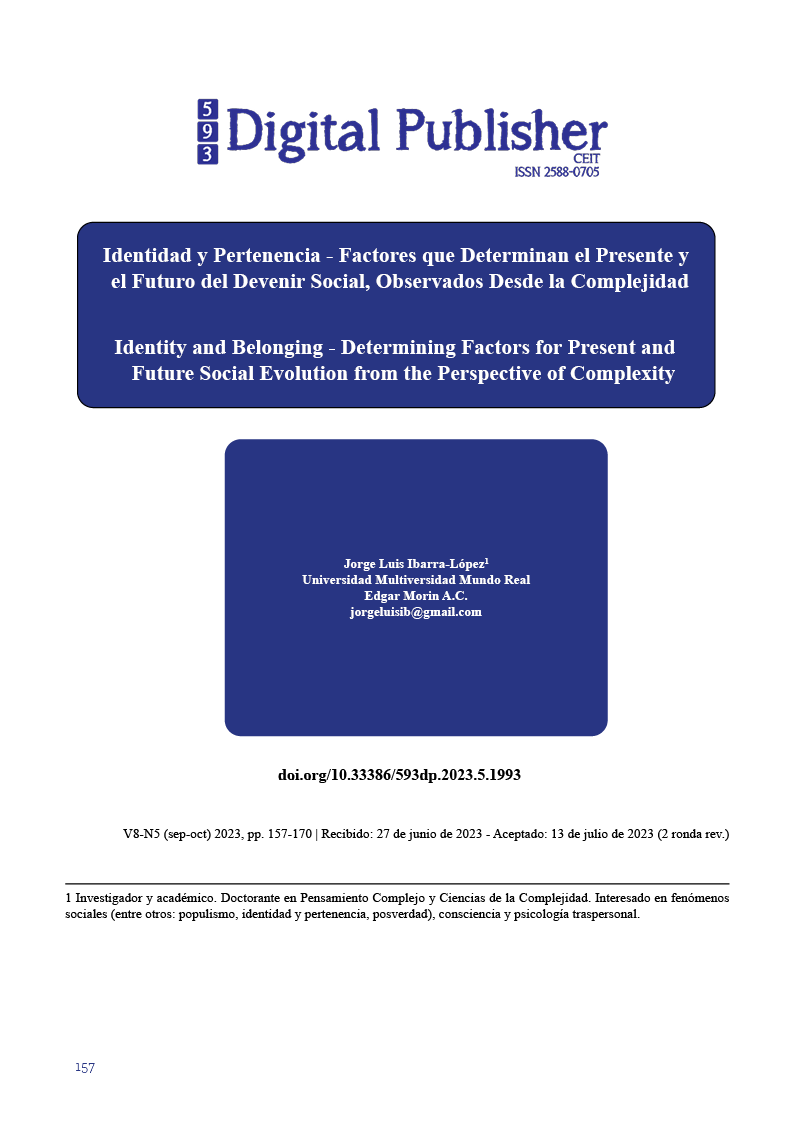Identity and Belonging Determining Factors for Present and Future Social Evolution from the Perspective of Complexity
Main Article Content
Abstract
Our identity and sense of belonging fundamentally determine our social position and status, among many other factors. Without detriment to our enormous adaptive capacity as human beings, some dimensions favour and, in many cases, force us to forge our condition as people and as members of society; those paths guide and constitute an essential component of the course that we will have to travel, in which character and the way we will face it. Social phenomena are multifaceted, and the relationships that occur within them are at the same time multidimensional and specific depending on the perspective, which, although immersed in a context of integrity and intrinsic unity, at the same time point to various manifestations and almost endless possibilities. We will explore the confines of these semantic categories and models that can help us re-learn to observe and re-think the causes and impacts of these social phenomena.
Downloads
Article Details

This work is licensed under a Creative Commons Attribution-NonCommercial-ShareAlike 4.0 International License.
1. Derechos de autor
Las obras que se publican en 593 Digital Publisher CEIT están sujetas a los siguientes términos:
1.1. 593 Digital Publisher CEIT, conserva los derechos patrimoniales (copyright) de las obras publicadas, favorece y permite la reutilización de las mismas bajo la licencia Licencia Creative Commons 4.0 de Reconocimiento-NoComercial-CompartirIgual 4.0, por lo cual se pueden copiar, usar, difundir, transmitir y exponer públicamente, siempre que:
1.1.a. Se cite la autoría y fuente original de su publicación (revista, editorial, URL).
1.1.b. No se usen para fines comerciales u onerosos.
1.1.c. Se mencione la existencia y especificaciones de esta licencia de uso.
References
Allen, K.A, Gray, D.L., Baumeister, R. & Leary, M. (2021). The Need to Belong: A Deep Dive into the Origins, Implications, and Future of a Foundational Construct. [La necesidad de pertenecer: una inmersión profunda en los orígenes, las implicaciones y el futuro de una construcción fundamental. Revisión de psicología educativa]. Educational Psychology Review 2022(34), 1133–1156. https://doi.org/10.1007/s10648-021-09633-6
Allen, K-A., Kern, M., Rozek, C., McInereney, D. & Slavich, G. (2021a). Belonging: A Review of Conceptual Issues, an Integrative Framework, and Directions for Future Research. HHS Public Access. Author manuscript. Aust J Psychol. Author manuscript. [Pertenencia: una revisión de problemas conceptuales, un marco integrador y direcciones para futuras investigaciones. Acceso público del HHS. Manuscrito del autor. Aust J Psychol. Manuscrito del autor].https://pubmed.ncbi.nlm.nih.gov/33958811/
Aragón, S. (2018). La realidad poliédrica: puntos ciegos, discrepancia social, ¿blockchain? Linkedin. https://www.linkedin.com/pulse/la-realidad-poliédrica-puntos-ciegos-discrepancia-social-aragón/?originalSubdomain=es
Bauman, Z., (2004). Identity: Conversations with Benedetto Vecchi. [Identidad: Conversaciones con Benedetto Vecchi]. 4. Cambridge: Polity Press.
Bauman, Z. (2020). Modernidad líquida. Fondo de Cultura Económica.
Baumeister, RF. & Leary, MR. (2017). The need to belong: Desire for interpersonal attachments as a fundamental human motivation. [La necesidad de pertenencia: deseo de vínculos interpersonales como motivación humana fundamental]. Psychological Bulletin, 117(3), 497–529. [PubMed: 7777651]. https://www.researchgate.net/publication/15420847_The_Need_to_Belong_Desire_for_Interpersonal_Attachments_as_a_Fundamental_Human_Motivation
Diaz, M. (2015). La paradoja de la elección. Hipertextual. https://hipertextual.com/2015/07/paradoja-eleccion
Dolezal, L. & Petherbridge, D. (editors), (2022). The Phenomenology of Belonging. Sunny Press. Szanto, T. (2022) Feeling Belonging and Feeling Solidarity. Two Forms of Social Cohesion? [La fenomenología de la pertenencia. Prensa soleada. Szanto, T. (2022) Sentir Pertenencia y Sentir Solidaridad. ¿Dos formas de cohesión social?].University of York. https://pure.york.ac.uk/portal/en/publications/loneliness-grief-and-the-lack-of-belonging
Escacena, M. (2021). El sentido de pertenencia: Por qué es tan importante para nuestros niños y esencial para comprender su comportamiento. Criar con sentido común. https://www.criarconsentidocomun.com/el-sentido-de-pertenencia-por-que-es-tan-importante-para-nuestros-ninos-y-esencial-para-comprender-su-comportamiento/#:~:text=El%20sentido%20de%20pertenencia%20es,tener%20un%20desarrollo%20emocional%20sano&tesxt=Los%20seres%20humanos%20somos%20seres,que%20somos%20importantes%20para%20ellos
Ferraris, M. (2019). Posverdad y otros enigmas. Alianza Editorial.
Frankl, V. (2015). El hombre en busca de sentido. https://www.amazon.com/El-hombre-busca-sentido-Spanish-ebook/dp/B019H695T4
Freud, S. (1921). Psicología de las masas y análisis del yo. https://www.amazon.com/-/es/Sigmund-Freud/dp/1540381846
Fukuyama, F. (2019). Identidad. La demanda de dignidad y las políticas del resentimiento. Ediciones Deusto. Editorial Planeta.
Giménez, T. (2016). Estudio sobre la cultura y las entidades sociales. Instituto Tecnológico y de Estudios Superiores de Occidente (ITESO). Secretaría de Cultura. https://vinculacion.cultura.gob.mx/capacitacion-cultural/intersecciones/vol-18/Estudios%20sobre%20la%20cultura%20y%20las%20identidades%20sociales.pdf
Green, J. (2013). Moral Tribes. Emotion, reason and the gap between us and them. [Tribus Morales. Emoción, razón y la brecha entre nosotros y ellos]. Atlantic Books. https://www.amazon.com/-/es/Joshua-Greene-ebook/dp/B00C5R7GRQ
Guillén, T. (2023). México 2023: entre una crisis migratoria y una política severa. Este país. Tendemcias y opiniones. https://estepais.com/tendencias_y_opiniones/crisis-migratoria-politica-severa/
Hopenhayn, M. y Sojo, A. (2011). Sentido de pertenencia en sociedades fragmentadas. América Latina desde una perspectiva global. Siglo XXI Editores.
Huerta, A. (2018). El sentido de pertenencia y la identidad como determinante de la conducta, una perspectiva desde el pensamiento complejo. IE Revista de investigación educativa de la REDIECH, 9(16). http://orcid.org/0000-0002-7214-9379
Ibarra, J.L. (2023). Populismo, un fenómeno dinámico y complejo. De la consciencia a la manipulación: el andamiaje de una tragedia. Revista del Centro de Investigación y Estudios Gerenciales (Euro-CIEG). Edición 62. Julio-Agosto, 2023. Recuperado de https://revista.grupocieg.org/wp-content/uploads/2023/06/Ed.62206-224-Ibarra.pdf
Le Bon, G. (2014). Psicologia de las masas. (Raíces de la memoria nº 12) https://www.amazon.com/-/es/Gustave-Bon-ebook/dp/B01922ED2C
Luhmann, N. (2009). La sociedad de la sociedad. Universität Belefeld. Universidad Iberoamericana. Editorial Herder.
Maslow, A. (1987). Motivation and personality. Pearson Education.
Maturana, H. (1980). Man and Society [ El hombre y la sociedad], en Benseler, F., Hejl, P. & Köck, W. (eds.). The Social Sciences.
Melucci, A. (1982). L'invenzione del presente: movimenti, identità, bisogni individuali. [La invención del presente: movimientos, identidades, necesidades individuales]. II Mulino.
Morin, E. (2017). Introducción al pensamiento complejo. Gedisa Mexicana.
Peña, S., Alonso, E. y González, I. (2021). La identidad de la familia. retos del cambio educativo en los momentos actuales. Revista Didasc@lia: XII(4), Octubre-Diciembre. D&E. Publicación del CEPUT- Las Tunas. https://dialnet.unirioja.es/descarga/articulo/8164225.pdf
Prieto, R. (2021). La transición religiosa de México. Nexos. Taller de datos. Punto decimal. PEAK Urban in the University of Oxford. https://datos.nexos.com.mx/la-transicion-religiosa-de-mexico/
Stanek, KC. & Ones, DS. (2023). Meta-analytic relations between personality and cognitive ability. Proceedings of the National Academy of Sciences. University of Minnesota. 2023;120(23):e2212794120. doi:10.1073/pnas.2212794120. https://www.pnas.org/doi/10.1073/pnas.2212794120
Swartz, B. (2009). La paradoja de la elección: Por qué más es menos. Harper Perennial. Harper Collins. ASIN: B000TDGGVU
Tajfel, H. y Turner, J. (2004). The social identity theory of intergroup behaviour. [La teoría de la identidad social del comportamiento intergrupal]. En Political psychology. https://web.mit.edu/curhan/www/docs/Articles/15341_Readings/Intergroup_Conflict/Tajfel_&_Turner_Psych_of_Intergroup_Relations_CH1_Social_Identity_Theory.pdf
Turner, T. (2017). El verdadero significado de la pertenencia. Reconectar con nuestro hogar interior. Dream School. Editorial Sirio.
Weil, S. (2003). The Need for Roots: Prelude to a Declaration of Duties Towards Mankind. [La necesidad de las raíces: preludio de una declaración de deberes para con la humanidad]. Routledge Classics. 2nd Edition. https://www.amazon.com/Need-Roots-Declaration-Routledge-Classics-ebook/dp/B087Z1VN9Y
Zarate, J. (2014). La identidad como construcción social desde la propuesta de Charles Taylor. ITESM México. Revista Eidos 23, July/Dec. 2015. PP. 117-134 http://dx.doi.org/10.14482/eidos.23.189


